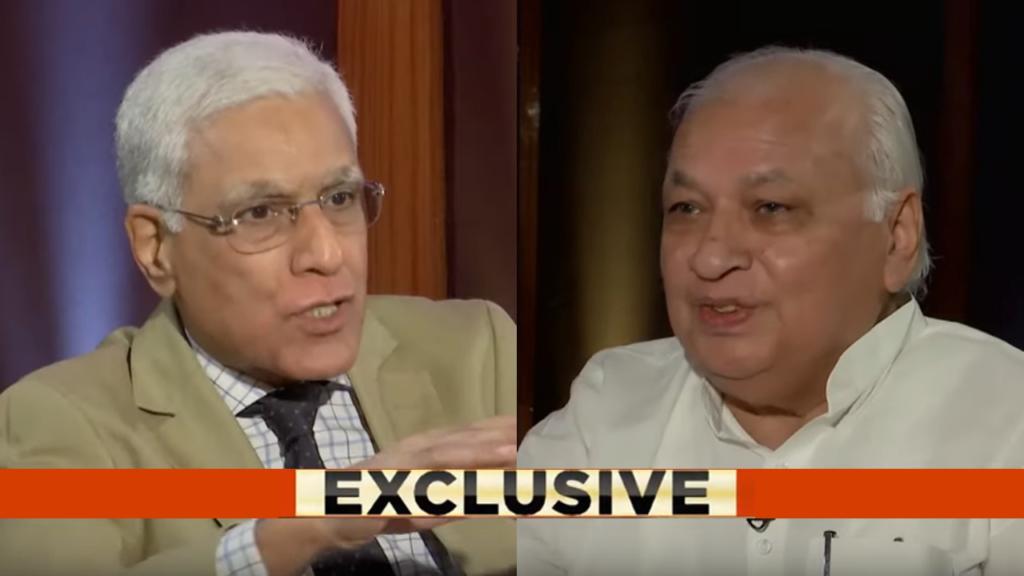Arif Mohd Khan, the former cabinet minister, who had come to limelight after he resigned following the overturning of the Shah Bano judgment in 1986 by the Rajiv Gandhi government, has dismissed the baseless concerns about the Modi government coming back to power voiced by the left-liberal cabal. He dismissed such concerns while giving an interview to Karan Thapar, a journalist known for his anti-Modi prejudices.
On being asked by Karan Thapar about whether he is worried about the fact that the Modi government does not have a single Muslim Member of Parliament and it did not field a single Muslim contestant in a state like Uttar Pradesh, Khan replied, “I don’t worry…where the question of worry comes (from). Basically, our problem is, we have got rid of the colonial rule but we have not got rid of colonial mindset.” He added that the British had put it in our minds through several measures that only a Muslim could represent Muslims, only a person coming from a particular community could represent that community. And that is why separate electorates were enacted. Slamming Thapar for this illogical question, Arif Mohd Khan stated that we are still talking in terms of colonial sentiment.
https://www.youtube.com/watch?v=Ok9WTEcrcjA&feature=youtu.be
When Karan Thapar said that the BJP consciously chooses not to have a Muslim legislator, the former cabinet minister made it clear that this was only Thapar’s opinion. When Thapar followed up with the question whether BJP is prejudiced towards Muslims and further asked about the BJP not fielding Muslim candidates, Arif Mohd Khan said that it was for the BJP to decide. And that they will field a candidate about whom they are confident.
Arif Mohd Khan made an excellent remark which exposed the faultlines in the ideology of analysing the religion of the elected legislators. He wondered that when he was an MP, was he representing a particular community or the constituency as a whole. The biggest problem of the mainstream media is that it cannot understand this simple fact. Once, an election candidate is enacted by the people of his constituency, he represents them as a whole, then where does the question of the legislator’s religion come from?
While Thapar continued to paint the BJP and the Modi government as anti-Muslim, but to his utter dismay, Arif Mohd Khan insisted that once the people of India elected the Modi government, there was no occasion to call the wisdom of people in question. The broad theme of the interview was Karan Thapar insisting that Muslims feel insecure under the present dispensation. However, Khan continued to slam him and expose his propaganda aimed at fear-mongering. He also delved into the interesting issue of how the colonial mindset has created an illusion of separate identities of different communities.
However, the moment that would haunt the entire left-liberal cabal was when Khan said, “Whether you call it Hindutva, Indianness or Bhartiyata, this is not a culture of uniformity, this is a culture of inclusiveness.” He further added that whatever Karan Thapar was saying about the ideology of BJP or RSS, were his words and he himself never heard any top RSS/ BJP leader say any such thing.
He also cracked down on the pseudo-seculars by stating that if secularism means creating an illusion of separate identity and denying a divorced woman of a particular right, the rights which accrue to the divorced women of any other religion, then such secularism must be exposed.
Khan’s interview was an exercise in demolition of the toxic propaganda peddled by certain sections of the mainstream media. It is welcome how he has called for truly separating religious identity from politics. It is time we get over the pseudo-secular ideology of looking at elections from caste and religion angles. Our constitution adopted the method of territorial representation and we have fortunately left behind the system of separate electorates. It is time we adopt the system in the way we analyse elections as well.
